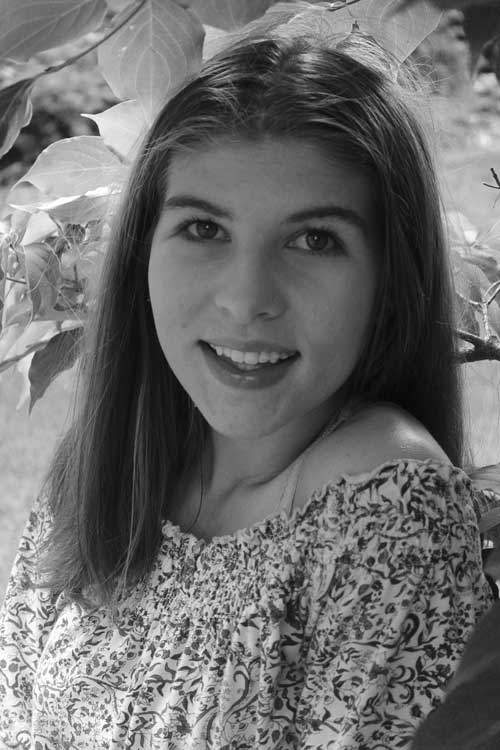

William R. Montgomery Fiction Scholarship Award – Fiction
Abby Riffel
Elk Rapids High School – Senior
Gresham liked books. He always had.
He liked the way his glasses slipped down the freckled bridge of his nose when he read, as if he was being sucked in, bit by bit. He liked learning about insects, or tsunamis, or magic wardrobes. He liked the way that words spun around his brain and filled up all the quiet spaces.
In fact, one could say that Gresham loved books.
Though he enjoyed reading about them, Gresham was rather friendless himself. Most of the other ten-year-olds in his class did not love books; they were too preoccupied with showing off their new phones and pelting dastardly aimed spitballs at the teacher’s sweater. It was confusing to them that he opted to shove his nose in a book instead of joining them on the swings. He had no siblings either, unless he counted Herbert, who was seventeen years older and directed sloppy film adaptations of perfectly good novels. His parents were nice people, the kind that made their own pie crust and polished their briefcases, but they were not people with time. And besides, they were far more fond of Herbert’s movies than they were of Dickens.
So, Gresham read.
He had learned many years before that his questions would not get a reply. Of course, if he would ask something simple, such as “Mother, are we out of milk?” or “What time is dinner?” there were always answers in supply. But Gresham already knew what time dinner was, and it is quite obvious if one is out of milk or not, so the only questions he had left were the ones that he did not have an immediate answer to. At first his parents and teachers were amused, hailing him as clever, a genius even. This did not last long. They soon tired of discussing, say, metamorphosis, or post-war reconstruction, and would instead hand him a book. It was easier than telling a child no taller than the cosmetic bureau that they hadn’t the slightest idea.
So, Gresham read.
He read about the free market system, phytoplankton, and heroes. He read about love, time travel, and geometry, and every time he had a new question he would read some more. His father would crane his head over the back of the recliner, one of Herbert’s films flashing from the television, and look to his wife with a chuckle.
“Reading another one of those books,” he’d say, and turn back to the screen, confident that Gresham must be very content indeed. Gresham’s mother would hum a nod, then return to the movie.
Gresham, however enthralled by every page he consumed, was not completely content.
He wanted a friend.
Monday after Monday slid by, along with the school year, and Gresham was beginning to worry; he did not want to spend another lonely summer helping his mother make pie crusts. He thought about this as he walked to the library on a particularly rainy day- big, frustrated droplets smacking at his umbrella- until he reached the establishment. Gresham grabbed the brass doorknob, plain and worn to tarnish by the hands of hungry minds, and pulled.
It was seven o’clock at night and Gresham, though clad in his pajamas and comfortably nestled underneath his quilt, could not sleep. He could not sleep at all.
“I did it.” he whispered to himself, “ I really did it!”
He rolled to his left. From his bedside table, a biography of Teddy Roosevelt glared up at him. “I did it, Teddy.” He whispered again, the picture of the president unmoving in reply. “I found a friend!”
Gresham’s stomach plummeted at his own words. He still did not know anything, not even a teaspoon’s worth, about being someone’s friend. He hadn’t had a real friend since first grade, when Max Turrel moved away to Idaho. What if she didn’t want to be his friend anymore, once she figured out that he was completely deficient?
Yes, his new friend was a girl, and she was beautiful. He met her at the library, which he believed was fate, if not an act of God.
He first saw her, perusing, in the non-fiction section. Her skin was a color he had never seen before, except in books; it was dark, like hot chocolate, and her teeth were perfect rows of glistening pearls. He wondered why none of his classmates shared her glowing features. The whites of her eyes popped against her skin, making it hard for Gresham to break eye contact, his gaze always floating back to their brightness. Gresham wished that more people in his world looked like her. He wished that he was not so pale and freckled, and instead had half-moon dimples on cocoa cheeks. He wished for his dark, flat hair to spring up in wild curls a and a gap to appear between his pearly front teeth.
“Why are you staring at me?” she said, interrupting is thoughts. A wizened expression creased her forehead, as though she had intercepted his staring before he realized that he even was doing so. Gresham froze. He had not anticipated that she would actually notice him.
“I-I didn’t mean to, I-” he stuttered as she chewed at her lower lip and cocked her head. “Never mind.” She interrupted him again; this time his words, not his thoughts.
“I’m looking for a book about Georges Mèliès. Have you seen one around here?” she chattered on, lifting onto her tiptoes to read the titles on the top shelf. “He created some of the very first movies, like ever.”
“I know.” Gresham replied quietly, deftly sorting through the second row of books. “My brother talks about him all the time. He makes movies too.”
“Wow.” she said, pulling free a burgundy colored book. She gave the title a quick scan and then slipped it back onto the shelf, letting out a “Tsk” of impatience. “I bet your brother talks about Mèliès to make himself sound smart. I’ve heard that directors are like that sometimes.”
Gresham looked to the floor for a minute, blinking. People were usually impressed with his brother, but then again, most people couldn’t pronounce Mèliès correctly either.
“Ah.” the girl said, returning from her tiptoes to the balls of her feet. “I think I was rude again. I’m sorry. I keep on telling my mouth to stay quiet, but lately it just …”
“It’s fine.” Now Gresham had his turn to interrupt. And he was smiling. “You’re right. And Herbert -that’s my brother- turns all of my favorite books into love stories. Anyways.” He stiffly reached out his hand, which was clutching a biography of the famous filmmaker.
This was his moment to make an introduction.
“Here’s your book.” Come on, he urged himself. Just your name.
She thanked him and took the book, and then she was gone before he had time to say anything else.
Gresham groaned. He had been so close.
“Oh, I almost forgot!” A head of wild curls popped back around the corner. “I can’t believe that I made a friend and didn’t even think to introduce myself.” She smiled and half-jumped, half-slid over to Gresham in her excitement. “I’m Layla.”
Gresham didn’t really remember much of what happened next.
All he knew was that he ran all the way home, arms spread wide- an eagle- heart spinning like a reel of film. Soaring.
Honey was a woman with fire in her belly. That’s how Layla described her grandmother to Gresham on their way to her house on a sunny, green, Tuesday afternoon. Even though they had been playing together for weeks, this was the first time that he had ever gone over to her house. With each footfall, Gresham tried to make sure each shoe hit each sidewalk square only once. Being of very small foot, and the squares quite large, it was turning out to be a more difficult task than he had anticipated, so he was too preoccupied to really think about what she said.
What? Fire can’t be in bellies. he thought distractedly before brushing it aside. He was coming to realize that when Layla talked, she said things that weren’t actually real. But they were always true things, so Gresham assumed that he would find out what she meant when he actually met Honey. He wasn’t expecting flames, but he repeated stop, drop, roll in his head a few times over, just in case.
Earlier that morning he and Layla had tumbled into his house, with bare knees stained from slides in the grass, breathless from their race inside. At the sight of them in their soiled glory, his mother exhaled an abrupt cough, the same noise she made when her dough didn’t rise properly in the oven.
“Gresham.” she warned in exasperation. “I’ve already told you to stop running around in all that dirt. You’ve gone and stained another shirt.”
Gresham, though breathless earlier, found himself suddenly too full of air, as though all of the panting and sprinting were being sucked back inside of him.
“My Grandma says that running around is good for kids.” Layla piped up. Her cheeks still held the luster of their romp, and her eyebrows perked up confidently. Gresham could tell that she had something more to say, and his stomach flipped. As far as he could tell, she didn’t have any qualms about challenging grown-ups.
“That’s nice.” his mother replied evenly, filling two glasses of orange juice for them. Gresham, however, could sense her surprise. He knew that she was not used to children who disagreed.
“Yes.” Layla continued matter-of-factly, taking a sip of juice before setting down her glass. “Honey- that’s her name, you know- says that if you don’t let us run around when we’re kids, we’re just going to run away as adults.” Layla, seemingly undisturbed, took another sip. “What do you think?” she asked Gresham’s mother, who had paused with the refrigerator door half-open, juice carton still in her hand.
“I think…” his mother trailed off in reply, returning the carton to the refrigerator before finishing her sentence.
Gresham eyed both his mother and Layla nervously. He didn’t want his only friend and his only mother to argue.
“I think that it sounds like Honey would appreciate your conversation. Why don’t you two head over and talk to her?” his mother said, shooing them. Her wrists were spindly and her palm flung about in the air dramatically as Gresham and Layla rose from their seats and made their way to the front door, orange juice abandoned. “Run along now.”
Gresham halted. He could not help but remember the philosophy book he had read the previous week. That’s called Tu quoque, he thought, when someone says one thing, only to act in an opposite manner. He opened his mouth in response, for he could not help but address the lapse in logic. “But you just said that I shouldn’t be running.”
“Gresham, you know what I — oh! There go my pies — burning!” his mother replied with another dismissive wave, hurrying the two children outside. Clearly, she was not in the mood to philosophize.
So that is how Gresham, on a Tuesday afternoon, found himself counting sidewalk squares and wondering about the nature of Layla’s flaming grandmother. He looked up from his feet, wincing as one of them stepped on a crack, at the shouts of Layla, who had picked up the pace to a run and was headed towards a compact bungalow situated on the far corner of the street. On its front porch stood a tall woman with broad shoulders, which were shaded by a wide-brimmed gardening hat.
Quickly, Gresham surveyed the house and the woman on the deck, who he could now see was smiling. There were no traces of smoke, and he did not hear the crackling of flames. So far, so good.
